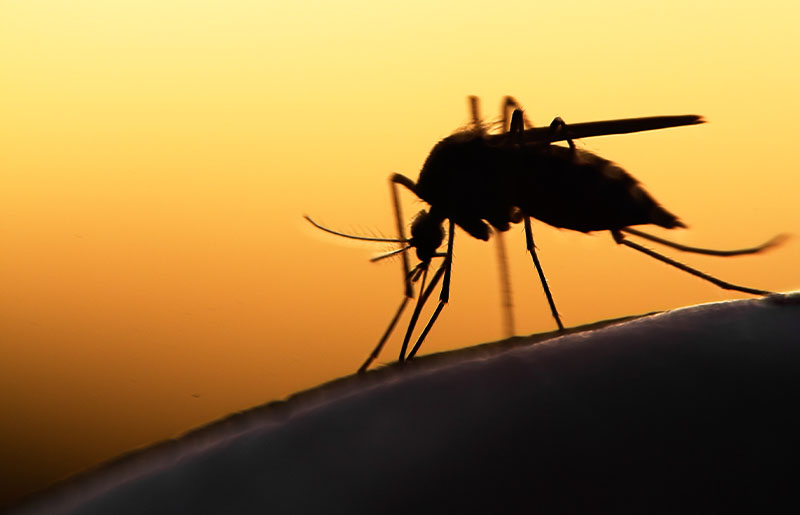
Harris County Public Health Encourages Houstonians to "Tip, Toss, Treat"this Mosquito Season
Mosquito season is upon us, and Harris County Public Health (HCPH) reminds residents to practice a few simple tips to reduce mosquito bites. With temperatures on the rise, residents should expect to see more mosquitoes outside, increasing the likelihood for disease transmission.
Mosquitoes are present throughout the year; however, peak mosquito activity occurs in warmer weather, typically from May through October. Out of the 56 species of mosquitoes found in Harris County, only a handful transmit disease-causing viruses, such as West Nile (WNV), Saint Louis encephalitis (SLE), chikungunya (CHIKV), dengue (DENV) and Zika (ZIKV).
HCPH’s Mosquito and Vector Control Division (MVCD) strives to ensure that residents are protected from mosquito-borne diseases year-round through countywide mosquito trapping, testing mosquito pools for viruses and treatment in neighborhoods where a virus is detected. Interactive maps of mosquito-borne disease activity, services and proposed treatment can be found at hcphtx.org/MosquitoControl.
In 2022, five cases of mosquito-borne viruses in humans – two persons with dengue, two with West Nile virus, and one with St. Louis encephalitis – were reported in Harris County. Out of the five cases, one person – a man in his 80s who resided in northeastern Harris County – died from WNV neurovascular disease. The Texas Department of State Health Services (DSHS) reported a total of seven human deaths in the state last year due to mosquito-borne disease (specifically West Nile).
“Last summer, we had a relatively low pool of mosquito samples that tested positive for West Nile as compared to previous years,” said Maximea “Max” Vigilant, Dr.PH, MPH, MVCD’s new director. “However, we lost one member of our community last year who unfortunately passed away due to complications from West Nile disease. This reminds us how serious these types of mosquito-borne illnesses can be to our most vulnerable community members – especially young children, the elderly and those who are immunosuppressed.”
“We have not tracked any positive mosquito samples from our surveillance and testing so far this year,” Vigilant added. “However, as we have seen in the past, a sudden surge of a virus in a mosquito population can happen at any time and pose a threat to residents in our communities. We encourage everyone to take a few simple measures to protect themselves and their loved ones from mosquito bites this season, such as emptying stagnant water from containers outside their homes or applying EPA-register mosquito repellents as directed.”
KNOW THE 3 Ts: TIP, TOSS, TAKE ACTION
As temperatures rise, so do mosquito populations. HCPH wants residents to remember the 3 Ts to mosquito control – “Tip, Toss, Take Action”.
Tip
-
Tip or empty standing water from pet bowls, flowerpots, tires, buckets and other containers.
- If you have a birdbath, change its water every three to five days.
Toss
-
Toss out debris, trash and other unwanted items around your home.
- Clean out clogged rain gutters.
- Keep outdoor trash bins closed and avoid overfilling them.
- Do not sweep lawn clippings, leaves or litter into storm drains as this will prevent water from flowing, creating ideal mosquito-breeding sites.
- Minimize opportunities for standing water to accumulate by emptying stagnant water from flowers pots, buckets, tires or any other water-collecting objects.
Take Action
-
Use as directed by the label instructions on the product.
- Do not use insect repellents on babies younger than 2 months of age.
- Do not use products containing oil of lemon eucalyptus or para-menthane-diol on children younger than 3 years of age.
- Apply an EPA-registered repellent on yourself and your loved ones when outdoors.
- When possible, wear long sleeves, pants, and socks.
- Treat standing water with larvicides in areas where water cannot be covered, emptied, or removed and will not be used for drinking. Larvicides are a type of pesticide that is applied to kill mosquitoes in their early stages of development (larvae) before they become biting adults. They are sold in forms of liquid, tablets, pellets, granules and briquettes and available in most hardware stores. Larvicides are safe to use for the environment. Follow the instructions of the particular larvicide product you are using.
- Make sure to completely turn off outdoor faucets to prevent leaks; fix any faucets that are constantly leaking
- Keep tight-fitting screens on doors and windows.
For other mosquito prevention tips and resources, visit hcphtx.org/MCVDResources.
Source: Harris County Public Health


